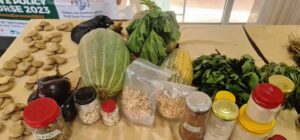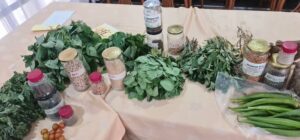
By Frank Kamuntu
Neglected and Underutilized Species (NUS) sometimes referred to as “local food plants” or “orphan crops“ are those to which little attention is paid or which are entirely ignored by agricultural researchers, plant breeders, and policymakers.
Now, PELUM Uganda says many of these varieties and species are being lost at an alarming rate, yet they present tremendous opportunities for fighting poverty, hunger, and malnutrition.
READ ALSO: Ugandan Farmers Kick Off Seed Systems Caravan 2023 To Improve Nutrition, Food Security & Income
PELUM Uganda, a part of the broader PELUM Association, is a network of over 280 civil society organizations from 12 African countries working to improve the livelihoods of smallholder farmers and the sustainability of farming communities through ecological land use management. Since its inception in 1995, PELUM Uganda has grown to include 71 member organizations operating in 122 districts and reaching approximately three million smallholder farmers.


”NUS can help make agricultural production systems more resilient to climate change. Not least, acknowledgement of the value of NUS in traditional foods and cultures can empower indigenous communities (women in particular) and reaffirm their identity,” says PELUM.
The organization says that influenced by the “modern world”, African people have jeopardized their good dietary habits attracted by processed, fast, high-sugar, and high-fat food which have condemned their population to lifestyle diseases such as diabetes, obesity, heart diseases, and some forms of cancer.
These come ahead of this year’s Green Action Week (GAW) which will be celebrated from 1st October to 8th October.
The theme of GAW 2023 is; ”Sharing Community Which Works for People and Planet.” and to boost this theme, PELUM has established a school exhibition at Lira Town College School Grounds in Lira City, Uganda.
This year’s GAW aims at enhancing school communities and consumer awareness, access and utilization of neglected underutilized indigenous/traditional and wild plant species that are well adapted to their native environments, highly nutritious and medicinal in nature to better manage climate change, and improve on food and nutrition security among schools.
Since 2013, PELUM Uganda has been a part of GAW and is still desirous of being part and parcel of the campaign to boost farmer-to-farmer knowledge, NUS /traditional and wild foods exchange and sharing as a way to create consumer awareness and sustainable utilization of neglected underutilized indigenous/traditional and wild food plant species.
READ ALSO: GIZ, PELUM Uganda Unveil Tool To Monitor & Promote Investors’ Relationship With Ugandans
”The neglect of NUS and failure to use them fully stems from a lack of awareness of their economic and nutritional value. Researchers, farmers, consumers, and policymakers focus on the major commodity crops. Public awareness campaigns, better information, and training can help schools and consumers realize the benefits NUS can bring and can encourage scientists and policymakers to optimize and promote these benefits,” says PELUM.
To address the food and nutrition challenges, PELUM Uganda says that they will be empowering small-scale farmers especially women and youth to strengthen their coping strategies through improved utilization of neglected and underutilized species using the Farmer Field School approach.
